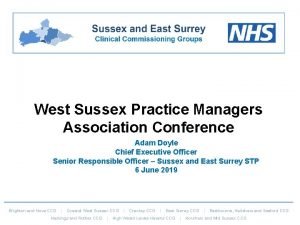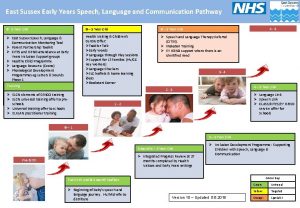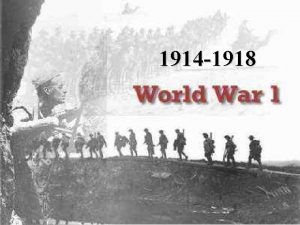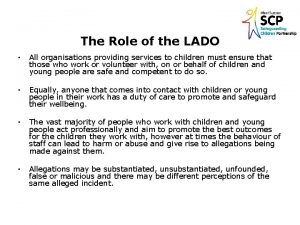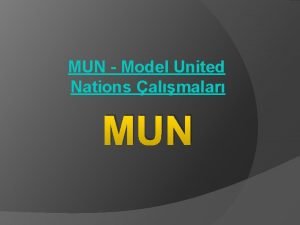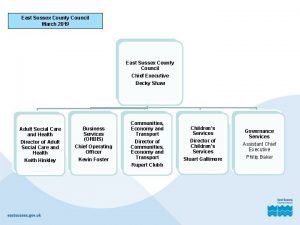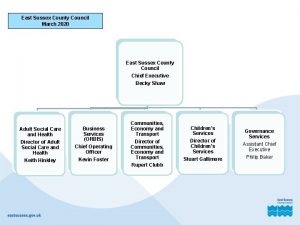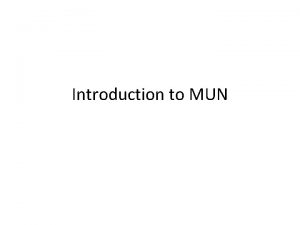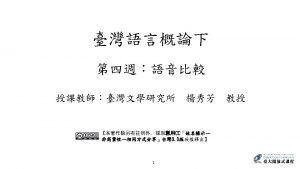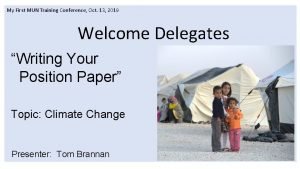Sussex MUN 2019 How to Research for MUN











- Slides: 11

Sussex. MUN 2019 How to Research for MUN conferences

1. Read the Handbook • the Secretariat will have written this • includes all the rules of procedures that are the same for all committees • you will get it in advance • introduces you to MUN and also to the conference procedures (SINCE THESE MIGHT VARY STRONGLY!) • especially important for unexperienced MUNers but please do all read it!

2. Read the Study Guide • is a document that the Chairs have written for the committee • Include topics, summary of those, where you can find further research etc. • Includes committee specific rules of procedure • Most important research you can do • Everyone else in the committee will have read it • Taken for granted as knowledge • Underline problems whilst reading • Pay attention to your country‘s name and bold terms

2. Read the Study Guide • Afterwards you should be able to anwer important questions and be able to summarize scenario • Who or what do the problems apply to? • Are any nations responsible for the issues? • Are the issues urgent, or do they require long term solutions? Are the topics related? How?

A tip about the topic • Clearly define what the topic is. • Identify the key terms related to the topic, and answer key questions about the topic such as “What causes this issue? ”, “Who is impacted by this issue? ”, and “Where is this issue most prevalent? ”. • Make sure you’re using credible sources of information to understand your topic- don’t just use Wikipedia, the news, or blogs!

3. Learn about your country • after having uderstood the Rules of Procedure of this MUN and the problem in general • How does it apply to your country? • Use CIA world Factbook, Wikipedia etc. to find out basics (foreign relations, stats, economy, main enemies and allies) • Where is it located? • Developing or developed? • Average GDP per capita? What is the economy dependent on?

3. Learn about your country • major imports / exports? • Involved in world conflicts? • Then: check major news • Make sure you know how major news relate to the topics in Study Guide • Think about how government would promote specific solutions to this problem (even if you can‘t find it in the internet you might be able to guess it from the information you‘ve gathered) • What benefits you? What benefits allies? What benefits world?

3. Learn about your country • look at past actions from your national government • What is your government policy? • if you don‘t know – how can you find out? • Is there proof? • how does this help you in this debate? Look at: Member States on the Record: Speeches at the United Nations, Member State Votes on Resolutions, Signature/Ratification Status for Each Country of Important Conventions and Treaties

4. Organize your solutions • write down full solutions to the problems • Write down pros and cons for each idea • Do they address all nations or only a few? • Are they moral? Expensive? Who will fund them? • Will other nations agree? • Do they fall under jurisdiction of your committee? • Long term, short term, middle term? • What are repercussions of your solution?

5. Strengthen solutions through Past internation Action • SOURCES • Statistics, UN resolutions, treaties, scientific research • How can you improve existing solutions if they already exist through a treaty or so? • Have similar solutions worked in the past? • Are there NGO‘s that tackle this problem in a specific way • This is to back up your solutions and prove that they will be successful

The types of Research • Country Profile – step 3 • Topic Background – Step 2, Study Guides + extra • Country Policy – Step 3 • Possible Solutions – Step 4 • Past International Action – step 5, sources => Can change order of Research but you have to cover these five above!!
 West sussex ccg merger
West sussex ccg merger Where was the sussex pledge signed
Where was the sussex pledge signed 7 kingdoms of england
7 kingdoms of england West sussex speech and language monitoring tool
West sussex speech and language monitoring tool Feudal system anglo saxons
Feudal system anglo saxons Sussex pledge
Sussex pledge West sussex lado
West sussex lado Sussex county board of health
Sussex county board of health Sussex msk partnership east
Sussex msk partnership east Fire risk assessment east sussex
Fire risk assessment east sussex Asset management east sussex
Asset management east sussex West sussex
West sussex
